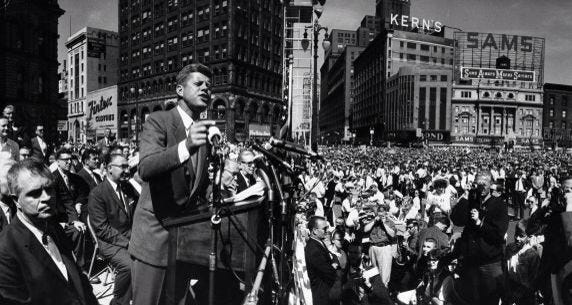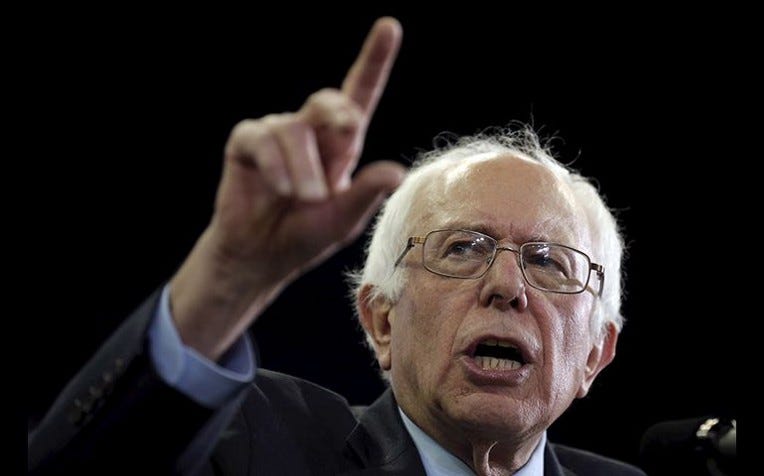In praise of a movement battered and bruised but not down
 |
| JFK at Detroit Labor Day Parade, 1960 — Photo: Walter Reuther Library |
I come from a union family and I married into one. My father-in-law sat in the 44-day sit-down strike in Flint, Michigan, when General Motors refused to recognize union rights for workers.
When I was a little girl I remember standing in a long line with my dad so he could vote for a union contract after a strike. I remember the Labor Day parades along Woodward Avenue in Detroit — union members marching, thousands strong, the parades lasting for hours and hours. (Like the one above with JFK.)
Strikes were hard on our families. They knew, going in, there would be hardships — no end in sight, no money coming in — but the goal was for better wages, better conditions,and for a sense of dignity that every working person deserved.
I remember being scared because I saw my parents were scared. I remember feeling relief when the ordeal was over and even small concessions were considered wins.
America was strong when unions were strong. Over the years their clout has diminished and there is no doubt workers are the worse for it. Wages are down and so are protections. Dignity and a sense of purpose is long gone. We were building a country and we were proud of our efforts. Now we aren’t.
I’m a member of the National Writers Union, UAW Local 1981/AFL-CIO (NWU). I pay my union dues gladly, knowing as a freelancer they’ll have my back if I ever have a dispute I can’t handle. (Because that’s what unions do. They advocate for workers.)
The NWU works with publications on contracts for freelance writers, negotiating for reasonable rates and conditions. (This is their agreement with The Nation.)
They issue press passes and provide legitimacy to writers who find
themselves trying to navigate a system set up to take, and only rarely
give.
In 2018 my union took on Ebony Magazine and won an $80,000 settlement
for 45 freelancers who hadn’t been paid for their work. There’s little
chance those writers would ever have seen money due them without the
clout of a strong union behind them.
But just yesterday, news came that The Arizona Republic is getting tough on staffers who are looking into union representation. They’ve gone from assuring them they don’t need a union to threatening lawsuits over what they call “surveilling” other staff members in an effort to coerce them into joining. The workers say it isn’t true.
Gannett, their parent company, is notorious for working against unions, which nobody but me seems to consider odd: Newspapers, those bastions of free speech, keep working to muffle voices pushing for representation. But there it is. That’s where we are now.
Every year around Labor Day I grow nostalgic for those days when labor was strong and management had respect for them — if even reluctantly. I think about those early labor advocates and marvel at their efforts, when the prospect of good wages or protections or even dignity seemed foolish and misguided, considering the good will of the businesses who were kind enough to hire them. (I’m kidding.)
So in case you missed them, I give you some quotes I’ve shared over the years on Labor Day:
Labor is the great producer of wealth: it moves all other causes.
Congressman Daniel Webster, 4/2/1824
“The first thing is to raise hell,” says I. “That’s always the first thing to do when you’re faced with an injustice and you feel powerless. That’s what I do in my fight for the working class.”
Mother Jones
With all their faults, trade unions have done more for humanity than any other organization that ever existed. They have done more for decency, for honesty, for education, for the betterment of the race, for the developing of character in man, than the other association of men.
Clarence Darrow, The Railroad Trainman, 1909
The history of America has been largely created by the deeds of its working people and their organizations. Nor has this contribution been confined to raising wages and bettering work conditions; it has been fundamental to almost every effort to extend and strengthen our democracy.
William Cahn, labor authority and historian
We insist that labor is entitled to as much respect as property. But our workers with hand and brain deserve more than respect for their labor. They deserve practical protection in the opportunity to use their labor at a return adequate to support them at a decent and constantly rising standard of living, and to accumulate a margin of security against the inevitable vicissitudes of life.
President Franklin D. Roosevelt, fireside chat, 1936
If I were a worker in a factory, the first thing I would do would be to join a union.
President Franklin D. Roosevelt
The first thing a dictator does is abolish the free press. Next he abolishes the right of labor to go on strike. Strikes have been labor’s weapon of progress in the century of our industrial civilization. Where the strike has been abolished … labor is reduced to a state of medieval peonage, the standard of living lowered, the nation falls to subsistence level.
George Seldes, Freedom of the Press, 1935
The right to join a union of one’s choice is unquestioned today and is sanctioned and protected by law.
President Harry S. Truman
Only a fool would try to deprive working men and women of the right to join the union of their choice.
President Dwight Eisenhower
There’s s a direct relationship between the ballot box and the bread box, and what the union fights for and wins at the bargaining table can be taken away in the legislative halls.
Walter Reuther
In light of this fundamental structure of all work… in light of the fact that, labor and capital are indispensable in any social system … it is clear that even if it is because of production in any social system … it is clear that even if it is because of their work needs that people unite to secure their rights, their union remains a constructive factor of social order and solidarity, and it is impossible to ignore it.
Pope John Paul II
The history of the labor movements needs to be taught in every school in this land. America is a living testimonial to what free men and women, organized in free democratic trade unions can do to make a better life. … We ought to be proud of it!
Vice President Hubert Humphrey
Our labor unions are not narrow, self-seeking groups. They have raised wages, shortened hours, and provided supplemental benefits. Through collective bargaining and grievance procedures, they have brought justice and democracy to the shop floor.
President John F. Kennedy, 1962
The AFL-CIO has done more good for more people than any (other) group in America in its legislative efforts. It doesn’t just try to do something about wages and hours for its own people. No group in the country works harder in the interests of everyone.
President Lyndon Johnson, 1965
Without a union, the people are always cheated, and they are so innocent. Cesar Chavez, United Farm Workers Union
 Labor
Day is an American holiday created by labor unions. It became a
national holiday in 1894, and since then it has been celebrated on the
first Monday in September, without fail. We celebrate the labor
movement on Labor Day each year because working hard and playing by the
rules (whose rules?) was not and never has been a ticket to
success in America. It took the labor movement to gather enough
strength to make sure hard working, rules-playing workers got a fair
shake in the workplace.
Labor
Day is an American holiday created by labor unions. It became a
national holiday in 1894, and since then it has been celebrated on the
first Monday in September, without fail. We celebrate the labor
movement on Labor Day each year because working hard and playing by the
rules (whose rules?) was not and never has been a ticket to
success in America. It took the labor movement to gather enough
strength to make sure hard working, rules-playing workers got a fair
shake in the workplace.Click here for the history of Labor Day.
And I leave you with the song that says it all:
Happy Labor Day weekend. Remember who we were when we were at our best.
(Cross-posted at Indelible Ink)



